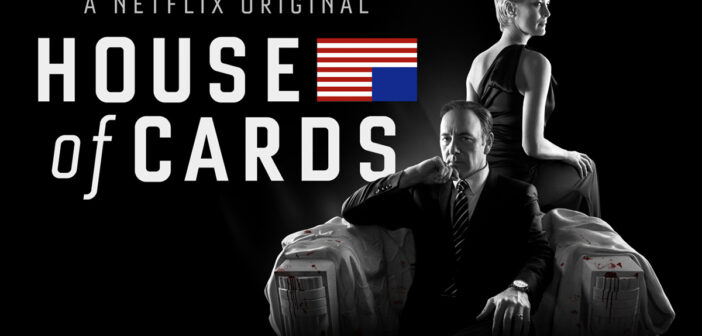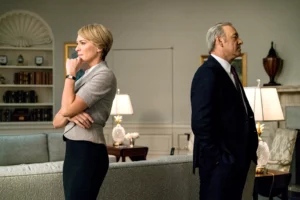“Democracy is so overrated”
With not too much due respect to Frank Underwood, I disagree with that statement, but I chose that quote of his to start out this piece because it sums up what made House of Cards so perfectly rated, especially in a world already saturated with searing commentaries on US political culture like The West Wing. Indeed, what separated this show from the rest of the crowd was its use of fourth wall breaks, which were always sure to deliver zingers, as dark as they were funny and often true by one Francis Joseph Underwood. From the start of the show’s debut trailer, we can already see this, when Frank tells the audience “Power is a lot like real estate. It’s all about location, location, location. The closer you are to the source, the higher your property value.” From the offset, this truly encapsulates the show’s main themes, the principal among them being power. Frank also infamously talked about how everything is about sex, except sex, which is about power. Evidently, the writing on this show was by far its biggest asset.
Having premiered 10 years ago, it might be hard to remember just what happened, so here’s a reminder for those of you who have had the twisted pleasure of watching this behemoth of a show, or a rundown for those who have yet to sit down and watch it – and you really should if you haven’t had the chance to already. Season one centers on Frank Underwood, a Democratic congressman from South Carolina hell-bent on getting revenge for having been passed over by the President for the role of Secretary of State. Along the way, we encounter his wife, Claire (Robin Wright), the CEO of a non-profit who, despite her charitable endeavours, is not unwilling to sacrifice her own morals for the sake of her husband’s career. That is not to say Claire lacks agency, and in fact, she is actually one of the show’s most complex characters as her own motives become transparent. But Claire is not the only woman in Frank’s life, as he is having an affair with journalist Zoe Barnes (Kate Mara) to whom he feeds information he wants to plant in the papers to push his political agenda. There was also Peter Russo (Corey Stoll), a congressman from Pennsylvania who meets an untimely demise in one of the show’s numerous ‘wtf’ moments perpetrated by our antagonistic protagonist. As I write this, I realise that this is something else that marks House of Cards as quite unique, because after all, how many times are we told a story from the perspective of the ‘bad guys’?
For a show where the main character is obsessed with legacy (like, seriously, it was concerning some of the sh*t that Frank was willing to do to climb to the top of DC), the streaming hit’s own legacy in Netflix’s history cannot be understated. House of Cards was the first major TV show to air exclusively on a streaming service, forever altering the way viewers consume media. With its first season, the show disrupted the status quo of the entertainment industry and allowed a real challenger to HBO for the first time, who until then had dominated high-quality and high-brow television.
Now, it’s impossible to talk about House of Cards without discussing its lead actor, Kevin Spacey, or more accurately, the controversy and scandal which has followed him over the last few years. In 2017, it was alleged by Anthony Rapp and, later, 15 others that the once-celebrated actor had sexually abused them, many of them minors, including on the House of Cards set. Equally disturbing is Spacey’s reoccurrence on flight logs to other famed sex offender Jeffrey Epstein’s private island. Obviously, what Spacey did was atrocious, and not too dissimilar to many of the hideous crimes perpetrated by his character on the show, and fortunately Netflix not only realised this, but acted on it, whereas in the past, other industry giants may have turned a blind eye. How did they get around this? Spoilers for season six ahead… Robin Wright took the reigns, with her character pursuing the Hillary Clinton, FLOTUS-to-POTUS pipeline. Being partial to Claire Underwood, later Claire Hale, myself, I enjoyed this shift, and it made sense from a story and business perspective.
But my sole opinion is not the only one that matters. What did audiences, critics and Hollywood think of it? Audiences clearly couldn’t get enough, with the show being renewed for five more seasons after its first, with its popularity expanded with each new instalment of the hit drama. Critics were also generally accepting, with the show scoring 85% on the controversial review-aggregation site Rotten Tomatoes. And as for Hollywood’s reception, it was nominated for a slew of television awards for its first season alone, mostly in production categories, though Robin Wright did win a Golden Globe for Best Actress – Television Series Drama for her performance, deservedly so, might I add.
I vividly remember starting this show in lockdown, something Frank Underwood would no doubt have had plenty to say about had he still been a player in politics during the pandemic. That is coming up three years ago, and yet its impact still sits with me. I look to the present political landscape in the States and can’t help but draw some uncanny comparisons between some ‘irl’ Washington personalities and the characters depicted in Beau Willimon’s House of Cards. Its a tie between this and VEEP for my favourite commentary on federal politics in the USA.
Watch the official trailer for season 1 of House Of Cards here, Via Netflix:





